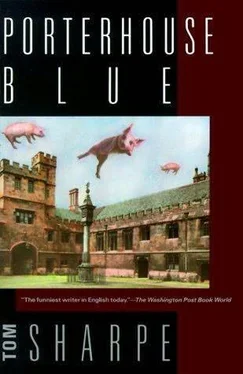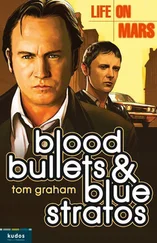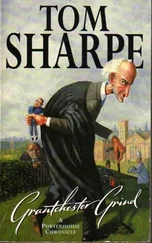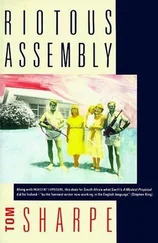Tom Sharpe - Porterhouse Blue
Здесь есть возможность читать онлайн «Tom Sharpe - Porterhouse Blue» весь текст электронной книги совершенно бесплатно (целиком полную версию без сокращений). В некоторых случаях можно слушать аудио, скачать через торрент в формате fb2 и присутствует краткое содержание. Жанр: Современная проза, на английском языке. Описание произведения, (предисловие) а так же отзывы посетителей доступны на портале библиотеки ЛибКат.
- Название:Porterhouse Blue
- Автор:
- Жанр:
- Год:неизвестен
- ISBN:нет данных
- Рейтинг книги:4 / 5. Голосов: 1
-
Избранное:Добавить в избранное
- Отзывы:
-
Ваша оценка:
- 80
- 1
- 2
- 3
- 4
- 5
Porterhouse Blue: краткое содержание, описание и аннотация
Предлагаем к чтению аннотацию, описание, краткое содержание или предисловие (зависит от того, что написал сам автор книги «Porterhouse Blue»). Если вы не нашли необходимую информацию о книге — напишите в комментариях, мы постараемся отыскать её.
Porterhouse Blue — читать онлайн бесплатно полную книгу (весь текст) целиком
Ниже представлен текст книги, разбитый по страницам. Система сохранения места последней прочитанной страницы, позволяет с удобством читать онлайн бесплатно книгу «Porterhouse Blue», без необходимости каждый раз заново искать на чём Вы остановились. Поставьте закладку, и сможете в любой момент перейти на страницу, на которой закончили чтение.
Интервал:
Закладка:
“I gather Sir Cathcart intends to call a meeting of the Porterhouse Society,” said Sir Godber.
“He’s cancelled it since the Zipser affair,” the Bursar told him.
“That’s interesting. So the Dean is on his own, is he?”
The Bursar nodded. “I think some of the Council have had second thoughts too. The younger Fellows would like to see changes, but they don’t carry much weight. So few of them too, but then we’ve never been noted for our Research Fellowships. We have neither the money nor the reputation to attract them. I have suggested… but the Dean…” he waved his hands helplessly.
Sir Godber gulped his port. In spite of it he was glad he had come. The Bursar’s change of tune was encouraging and Sir Godber was satisfied. It was time to talk frankly. He knocked out his pipe and leant forward.
“Between ourselves I think we can circumvent the Dean,” he said, tapping the Bursar on the knee with a forefinger with a vulgar assurance. “You mark my words. We’ll have him where we want him.”
The Bursar stared at Sir Godber in startled fascination. The man’s crudity, the change from an assumed urbanity to this backstair forcefulness took him by surprise, and Sir Godber noted his astonishment with satisfaction. The years of calling working men whom he despised “Brother” had not been wasted. There was no doubting the menace in his grim bonhomie. “He won’t know his arse from his elbow by the time we’ve finished with him,” he continued. The Bursar nodded meekly. Sir Godber hitched his chair forward and began to outline his plans.
Skullion stood in the Court and wondered at the lights burning in the Bursar’s room.
“He’s staying late,” he thought. “Usually home by nine, he is.” He walked through to the back gate and locked it, glancing hopefully at the spiked wall as he did so. Then he turned and made his way through the Fellows’ Garden to New Court. He walked slowly and with a slight limp. The exertions of the chase had left him stiff and aching and he had still not recovered from the shock of the explosion in the Tower. “Getting old,” he muttered and stopped to light his pipe, and as he stood in the shadow of a large elm the light in the Bursar’s room went out. Skullion sucked at his pipe thoughtfully and tamped the tobacco down with his thumb. He was about to leave the shelter of the elm when a crunch of gravel on the path caused him to hesitate. Two figures had emerged from New Court and were coming towards him deep in conversation. Skullion recognized the Master’s voice. He moved back into the shadows as the two figures passed him.
“No doubt the Dean will object,” Sir Godber was saying, “but faced with a fait accompli there won’t be anything he can do about it. I think we can take it that the days of the Dean’s influence are numbered.”
“Not before time,” said the Bursar. The two figures disappeared round the side of the Master’s Lodge. Skullion emerged from the shadow and stood on the path peering after them, his mind furiously occupied. So the Bursar had gone over to Sir Godber. Skullion wasn’t surprised. He had never had much time for the Bursar. The man wasn’t out of the top drawer for one thing and for another he was responsible for the wages of the College servants. Skullion regarded him more as a foreman than a genuine Fellow, a paymaster, and a mean one at that, and held him responsible for the pittance he received. And now the Bursar had gone over to Sir Godber. Skullion turned and made his way into New Court with a fresh sense of grievance and some perplexity. The Dean should be told but Skullion knew better than to tell him. The Dean didn’t approve of eavesdropping. He was a proper gentleman. Skullion wondered what a fate accomplee was. He’d have to think of some way of warning the Dean in the morning. He went through the Screens and across to the Porter’s Lodge and made himself some cocoa. “So the Dean’s days are numbered, are they?” he thought bitterly. “We’ll see about that.” It would take more than Sir Godber Evans and the miserable Bursar to change things. There was always Sir Cathcart. He’d see they didn’t get their way. He had great faith in Sir Cathcart. At midnight he got up and went outside to close the front gate. During the day the thaw had set in and the snow had begun to melt but the wind had changed during the evening and it had begun to freeze again. Skullion stood in the doorway for a moment and stared out into the street. A middle-aged man slipped on the pavement opposite and fell. Skullion regarded his fall without interest. What happened outside Porterhouse was none of his affair. With a sudden wish that the Master would slip and break his neck, Skullion went back into the College and shut the door. Above him in the Tower the clock struck twelve.
Chapter 11
On the towpath by the river the Dean stood huddled in his overcoat against the wind. Behind him the willows shuddered and shook and the hedgerow rustled. In front the eights rowed through choppy water, each with its coterie of coaches and supporters splashing through the puddles on their bicycles and shouting orders and encouragement. On every stroke the coxes jerked backwards and the boats leapt forwards, each in pursuit of the eight ahead and each in turn in flight from the eight behind. Occasionally a sudden burst of cheering signalled a bump as one eight touched the boat in front and the two pulled into the side of the river and the victors broke off a willow branch and stuck it into the bow. There were gaps in the procession where bumps had been achieved, spaces of empty water and then another eight would appear round the bend still trying desperately to catch the boat at least two lengths ahead and overbump. Jesus. Porterhouse. Lady Margaret. Pembroke. Trinity. St Catherine’s. Christ’s. Churchill. Magdalene. Caius. Qare. Peterhouse. Historic names, hallowed names like so many prayers on a rosary of racing boats to be repeated twice yearly at Lent and after Easter. To the Dean the ritual was holy, a sacred occasion to be attended, no matter how cold or wet the weather, in memory of the healthy athleticism of the past and the certainties of his youth… The Bumps were a time of renewal for him. Standing on the towpath he felt once more the innocence, the unquestioning innocence of his own rowing days and the fitness of things then. Yes, fitness, a fitness not simply of body, or even of mind, but of things in general, an acceptance of life as it was without the insidious subversion of questions or the dangerous speculations which had gained momentum since. A guiltless time, that, a golden age of assurance before the Great War when there was honey still for tea and a servant to bring it too. In memory of that time the Dean braved the wind and the cold and stood on the towpath while the bicycles splashed mud on to his shoes and the eights rowed by. When it was all over he turned and trudged back to the Pike and Eel where his car was parked. Behind him and in front, strung out along the path, old men like himself turned up the collars of their overcoats and headed home, their heads bent against the wind but with a new sprightliness in their step. The Dean had reached the railway bridge when he was aware of a familiar figure in front. “Afternoon, Skullion. We rowed over again,” he said. Skullion nodded. “Jesus never looked like catching us,” the Dean said, “and we should bump Trinity tomorrow. It was the choppy water that stopped us today.”
They walked on in silence while the Dean recalled other Bumps and famous crews and Skullion tried to think of some way of broaching the subject of the Bursar’s treachery without offending the Dean’s sense of what was proper for College servants to say. It wasn’t easy even to walk beside the Dean. Not his place, and presently Skullion gave up the unequal struggle with his conscience and gradually fell back a pace or two behind the old man. At the Pike and Eel the Dean, still lost in thought, unlocked his car and climbed in. Skullion fetched his bicycle and wheeled it across the footbridge. Behind him the Dean sat in his car and waited for the traffic to clear. He had forgotten Skullion. He had forgotten even the Bumps and the youth they had recalled to him. He was thinking about Sir Godber and the glibness of his modernity and the threat to Porterhouse he represented. His feet were cold and the joints in his knees ached. He was an old man, bitter at the loss of his power. When the last of the other cars had gone he started the engine and drove home through the factory workers coming out of Pye’s television factory. Cars pulled out of the factory gates in front of him. Men on bicycles ignored him and girls ran across the road to catch their buses. The Dean eyed them angrily. In the old days he would have blown his horn and cleared them off the road. Now he had to sit and wait. He found himself staring at an advertisement. “Watch with Carrington on Pye”, it said and a face smiled at him from a television screen. A familiar face. A face he knew. “Carrington on Conservation. The Nation’s Heritage at Stake.” The Dean stared at the face and was suddenly conscious of new hope. Behind him someone hooted importunately and the Dean put his car in gear and moved forward. He drove steadily home, unaware now of the traffic and of the present.
Читать дальшеИнтервал:
Закладка:
Похожие книги на «Porterhouse Blue»
Представляем Вашему вниманию похожие книги на «Porterhouse Blue» списком для выбора. Мы отобрали схожую по названию и смыслу литературу в надежде предоставить читателям больше вариантов отыскать новые, интересные, ещё непрочитанные произведения.
Обсуждение, отзывы о книге «Porterhouse Blue» и просто собственные мнения читателей. Оставьте ваши комментарии, напишите, что Вы думаете о произведении, его смысле или главных героях. Укажите что конкретно понравилось, а что нет, и почему Вы так считаете.












